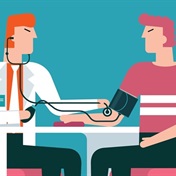Today is World Hypertension Day (WHD) and the theme for 2010 is Healthy Weight, Healthy Blood Pressure.
Hypertension is the medical term for high blood pressure, and is often referred to as the 'silent killer' because there are rarely visible symptoms warning you that your blood pressure is high. In more advanced cases, headaches, visual disturbances, nosebleeds, nausea and vomiting, sleepiness and even seizures may be experienced. Two out of three people with high blood pressure are unaware of the condition and is estimated that one in four South Africans between the ages of 15 and 64 years suffers from high blood pressure. Hypertension is one of the leading causes of heart attacks, strokes, kidney failure and premature death.
What is high blood pressure?
Blood pressure is the pressure of the blood in your arteries that is needed to keep blood flowing through your body. High blood pressure develops if the walls of the larger arteries lose their natural elasticity and become rigid, and the smaller blood vessels become narrower.
A normal blood pressure is ideally 120/80 or less and a high-normal reading may go up to 139/89. If your blood pressure is above this, the Heart and Stroke Foundation SA recommends that you have your BP number checked by a medical doctor.
Risk factors for high blood pressure:
- A family history of high blood pressure.
- Ethnic groups: the black African population has a greater predisposition to hypertension.
- Age: the risk of developing high blood pressure increases with age (it occurs most often in men over the age of 35 years).
- Being overweight (especially around the stomach area) contributes to a 2-6 times higher risk.
- An unhealthy diet, including a high salt intake.
- Excessive alcohol consumption.
- Physical inactivity.
- Smoking.
- Stress.
- Pregnancy.
- Certain medications like birth control pills, steroids and anti-inflammatory drugs.
- Severe kidney disease.
What harm does high blood pressure do?
An uncontrolled, high blood pressure can lead to a heart attack or stroke, kidney failure and damage to eyesight (glaucoma, blindness). The increased workload can also make the heart become too weak, less efficient and eventually lead to heart failure. Tiredness, shortness of breath and swollen ankles are often experienced.
How to lower your blood pressure level?
- Eat small, regular meals every day.
- Eat a healthy, balanced diet.
- Enjoy a variety of fruits and vegetables (at least 5 servings a day).
- Include foods that are high in fibre (e.g. whole grains and nuts).
- Avoid fatty foods, especially those that are high in saturated fats (e.g. full cream dairy products, meat, chicken skin and fried foods).
- Eat foods that are high in fibre and whole grains (limit refined foods and drinks high in added sugars).
- Choose Heart Mark products when shopping or eating out as these are healthier alternatives – visit www.heartmark.co.za for a list of products endorsed by the Heart and Stroke Foundation SA.
- Overweight people are advised to lose weight. Losing as little as 5% to 10% of your total body weight can lead to a meaningful drop in blood pressure.
- Limit total salt (sodium chloride) intake. This not only includes table salt but also salt that is hidden in foods).
- If you drink alcohol, do so in moderation. Limit daily intake to one drink per day in women and two drinks per day in men.
- Caffeine in coffee, tea, cola drinks, chocolate, energy drinks and weight loss products may cause blood pressure to increase temporarily.
- Include regular physical activity as part of your daily routine (aim for at 30 minutes five times a week).
Free Blood Pressure screenings are offered by the Heart and Stroke Foundation SA on a monthly basis at malls throughout Cape Town. Contact Nuha on 021 447 4222 for venue and date information. The Heart and Stroke Foundation SA (HSFSA) encourages all South Africans to have their blood pressure checked at least once a year (more often if there is a history).
Furthermore, the Director of Health and Nutrition and Registered Dietitian at the HSFSA, Shan Biesman-Simons implores all hypertension sufferers to take all blood pressure medication exactly as prescribed, don't stop or change it unless advised to do so by your doctor.
For more information on high blood pressure, visit www.heartfoundation.co.za or contact a HSFSA Dietitian on the Heart Mark Diet Line on 0860 223 222 for free nutritional advice.
Information supplied by the Heart and Stroke Foundation.




 Publications
Publications
 Partners
Partners














